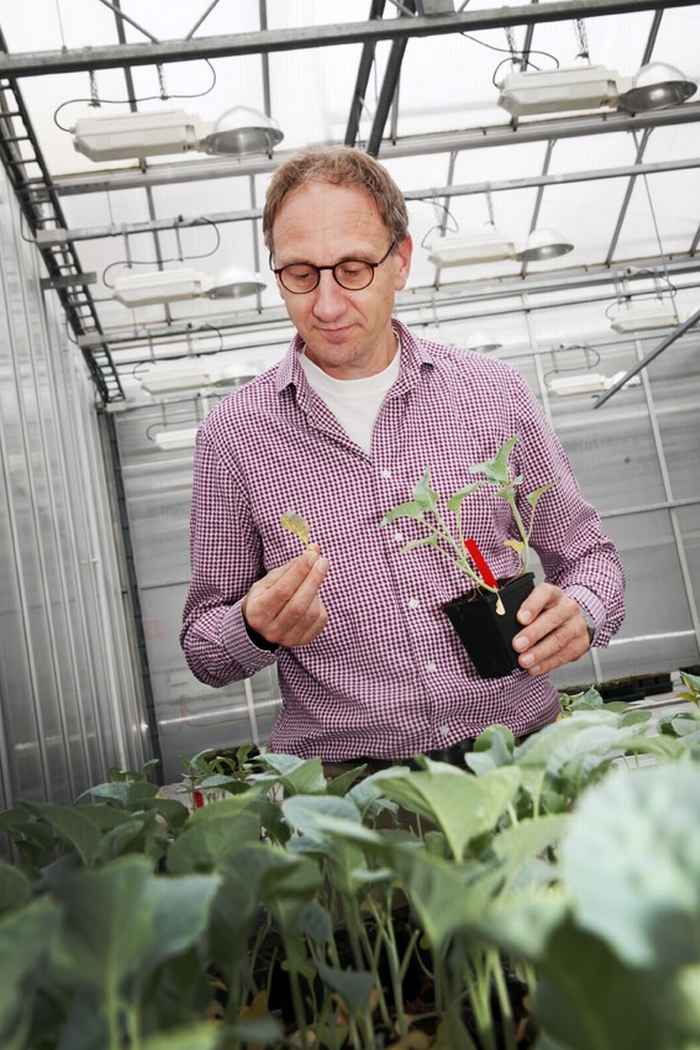Farewell to Harrold van den Burg
13 May 2022

As molecular plant pathologist, van den Burg is deeply interested in both basic and applied biology of plant-associated microbes that cause disease on plants. Harrold joined the UvA as Assistant Professor in 2011, becoming Associate Professor in 2019. The research conducted in his group centers around plant genetics, omics approaches, and functional studies to increase our understanding of plant pathogens. Together with UvA professor Marcel Prins, he studied how notorious plant viruses manipulate their host plants.
I am driven to make a meaningful impact on Plant breeding. In that light I have studied plant-microbe interactions ever since my PhD
From Plant biochemistry to Plant-Microbe interactions
During his PhD research at Wageningen University, van den Burg discovered that specific proteins expressed by fungi, named fungal effectors, can shield the fungal cell wall by forming a protective layer against plant cell wall degrading enzymes (CWDEs). For his postdoctoral research, van den Burg received a EU-Marie Curie fellowship to study Ubiquitin-dependent immune signaling in tomato (The Sainsbury Laboratory, Norwich-UK). In 2005, he was awarded both an EMBO long-term fellowship and an NWO-Veni grant to develop a research line at Molecular Plant Pathology in Amsterdam at SILS. This work initially focused on the role of the protein modification SUMO in plant immunity. By now the long-term research goal of the group has shifted towards pathogenicity strategies of important plant-pathogenic bacteria and plant viruses. This work is supported by different Topsector T&U grants from the Dutch government and breeding companies with the aim to transfer the knowledge gained towards industry. The group developed a state-of-the-art plant imaging system to study real-time bacterial spread inside plants in a non-invasive manner. Van den Burg: 'This setup has allowed us to track bacteria from the initial invasion side at the leaf margin (hydathodes) towards the midvein. With this phenotyper the group studies how the bacterium Xanthomonas campestris pv. campestris breaks the hydathode-xylem barrier'. This bacterium is still the number one disease for Cabbage growers worldwide, but the knowledge gained is also important for diseases caused by Xanthomonas on lettuce, rice, barley, banana, and cassava.
Connect genetic approaches with the power of AI and mechanistic modelling to explore the reservoir of complex traits
The development of more resilient crops is a major societal challenge. With a changing climate with more weather extremes and ever stricter environmental regulations, farmers are facing less favorable conditions to grow their crops (such as heat, drought, flooding, and pathogens). At the same time, they are facing bans on pesticides and a need to reduce their dependency on fertilizers in the coming decade. In CROP-XR, a prominent group of Dutch researchers will develop a revolutionary method to make crops more resilient. CROP-XR was recently awarded in the second round of the National growth fund (NGF). Van den Burg is part of the core team that came up with this idea.
'It is really a joint effort of four Dutch universities, leading plant breeding companies, and AgBio companies. By combining big data ‘omics’ approaches with artificial intelligence (AI) and functional modelling, the consortium will learn to understand and predict how plants can better withstand stress conditions thanks to a complex interplay of genetic factors. This knowledge will then be used to develop stronger, more resilient varieties of several model crops, that can be grown sustainably.'
Keygene
Keygene is an Agricultural Biotechnology (AgBio) company founded in 1989 that develops and applies technology innovation for crop improvement. Their headquarters is located in Wageningen, the Netherlands. Keygene has been an important partner of our university for many years participating in a wide-range of research projects with SILS researchers in the past years.
With the appointment of Harrold van den Burg as VP I4C at Keygene and the legacy of the successful projects that he initiated during his career at SILS, he continues to create fruitful opportunities and impact for the plant breeding field.
Read more
- Website Molecular Plant Pathology
- Website KeyGene
- Website CROP-XR